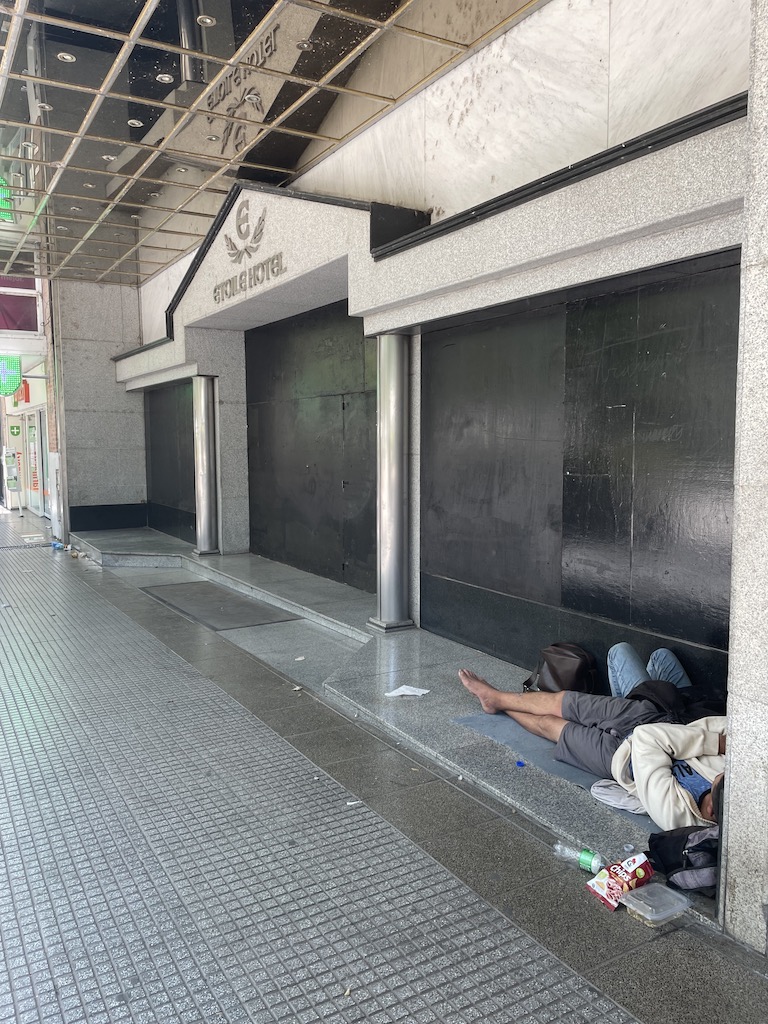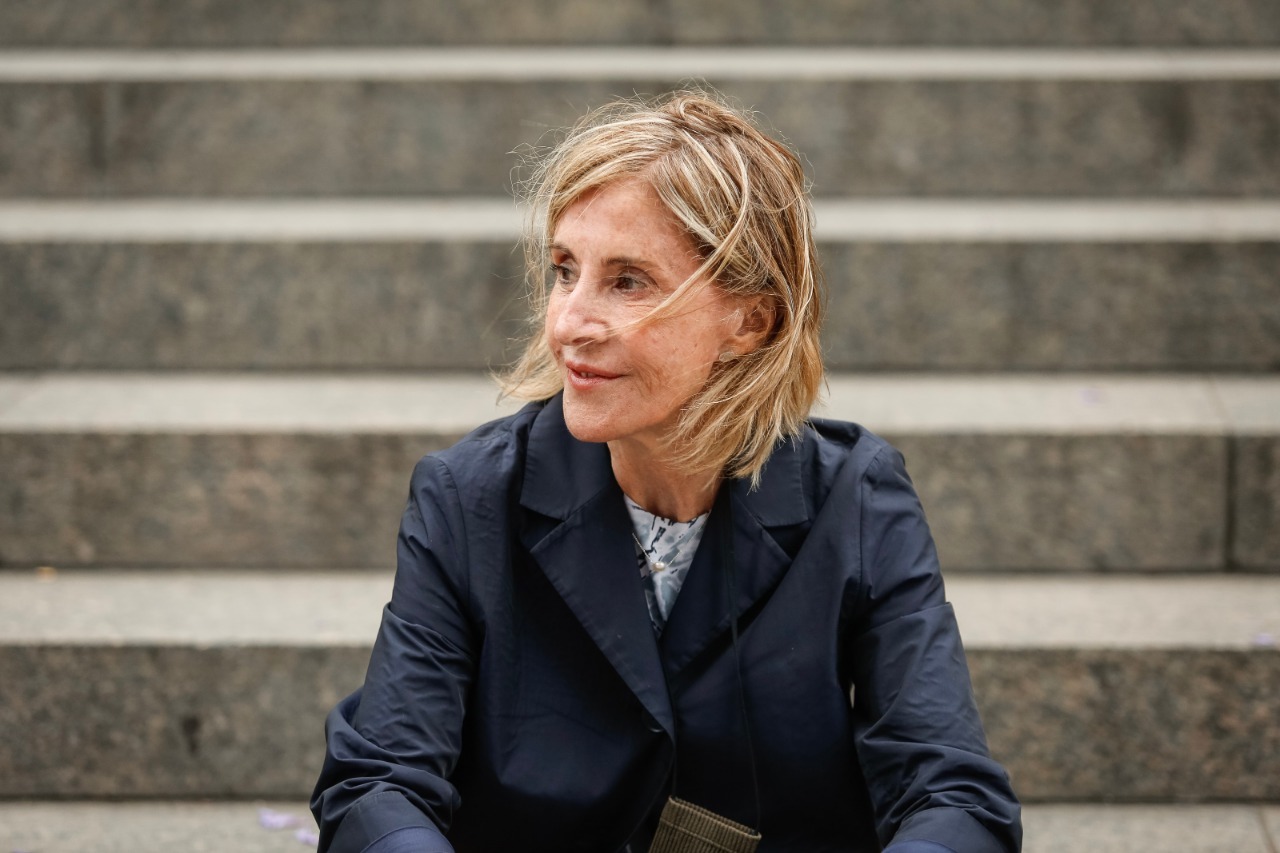Hotel Étoile
El Hotel Étoile, uno de los hoteles más tradicionales de Recoleta, está tapiado. La pandemia, seguramente, tuvo que ver. Durante casi dos años se interrumpió el incesante tráfico de turistas a Buenos Aires y muchos hoteles (y también comercios de todo tipo) se vieron obligados a cerrar. Por tanto, lo que llama la atención de la imagen no es eso, sino la presencia de dos desamparados durmiendo allí. En Argentina hace un tiempo, se ha impuesto un eufemismo. Se habla de personas “en situación de calle” para referirse a quienes no solo carecen de hogar sino de trabajo. Son gente que vive por debajo de línea de pobreza, indigentes que suman más de un 20% de la población de la ciudad, entre los que hay hombres, mujeres y niños, que a veces circulan solos, a veces en grupos familiares. No se sabe dónde y cómo comen, cómo y dónde se higienizan (si lo hacen), por qué zonas circulan, cuándo deciden tirarse a dormir.
La foto la saqué un día sábado por la mañana. Dado que son días agradables ahora en Buenos Aires y que frente al hotel está el hermoso parque de Recoleta con sus árboles añosos y sus cafés en las veredas, el área estaba muy concurrida. Joggers, mujeres con cochecitos de bebé, parejas de todas las edades, iban y venían. Algunas personas hacían fila para visitar el cementerio más elegante de Buenos Aires. Otras se dirigían apuradas a la Feria Artesanal que se instala allí los fines de semana.
Me quedé unos minutos observando la escena.
Nadie parecía reparar en lo que yo miraba.
La pobreza, con su consiguiente recordatorio de las desigualdades sociales, tiene una manera curiosa de anestesiarnos. Sin duda porque sentimos vergüenza o culpa, o porque preferimos ignorar la humillación que adivinamos en quien padece a tal grado.
Yo llevaba un libro en la mano— Minima Moralia, Reflexiones sobre la vida dañada, de Theodor Adorno. Lo guardé en la cartera. Saqué la foto y me volví a casa en silencio.
Hotel Étoile
Das Hotel Étoile, eins der Traditionshäuser im Stadtteil Recoleta, ist vernagelt. Das hat gewiss mit der Pandemie zu tun. Für fast zwei Jahre war der Strom der Touristen nach Buenos Aires unterbrochen, und viele Hotels sahen sich (wie etliche andere Geschäfte auch) gezwungen zu schließen. Das ist es also nicht, was auf dem Bild aufmerken lässt, sondern dass dort zwei Obdachlose schlafen. In Argentinien hat sich seit einiger Zeit ein Euphemismus durchgesetzt. Mit »Menschen in Straßensituation« werden diejenigen bezeichnet, die weder eine Bleibe noch eine Arbeit haben. Sie leben unterhalb der Armutsgrenze, sind mittellos und stellen 20% der Stadtbevölkerung, Männer, Frauen und Kinder, die manchmal allein, manchmal als Familie unterwegs sind. Man weiß nicht, wo oder wie sie sich ernähren, wo oder wie sie sich reinigen (sofern sie es tun), in welchen Gegenden sie unterwegs sind, wann sie beschließen, sich schlafenzulegen. Das Foto habe ich an einem Samstagmorgen gemacht. Weil es in Buenos Aires gerade sommerlich ist und gegenüber dem Hotel der schöne Recoleta-Park mit seinen alten Bäumen und Caféterrassen liegt, war die Gegend belebt. Jogger, Frauen mit Kinderwagen, Pärchen jeden Alters, ein Kommen und Gehen. Einige standen an, um den nobelsten Friedhof von Buenos Aires zu besuchen. Andere strebten zum Markt für Kunsthandwerk, der dort jedes Wochenende stattfindet.
Ich blieb ein paar Minuten und betrachtete die Szene.
Niemand schien auf das zu achten, was ich ansah.
Die Armut und die mit ihr einhergehende Erinnerung an die soziale Ungleichheit betäuben uns auf eigentümliche Weise. Zweifellos, weil wir Scham oder Schuld empfinden oder lieber nichts wissen wollen von der Demütigung, die wir bei denjenigen erahnen, die so stark davon betroffen sind. Ich hielt ein Buch in der Hand — Minima Moralia, Reflexionen aus dem beschädigten Leben von Theodor W. Adorno. Ich schob es in meine Handtasche. Ich machte das Foto und ging still zurück nach Hause.
Übersetzung: Svenja Becker
Hotel Étoile
Étoile Hotel, one of the most traditional hotels in the Recoleta district of Buenos Aires, is all boarded up. The pandemic has certainly had something to do with it. The never-ending comings and goings of tourists in Buenos Aires was interrupted for almost two years, and many hotels, as well as a variety of stores and businesses, were forced to close their doors. And, yet, the fact that the hotel has been boarded up is not what stands out―it’s the homeless who have been sleeping there. For some time now, a certain euphemism has been imposed in Argentina. There have been talks about personas en situación de calle (literal translation: “people in street situation”) to refer to those who not only need a place to live, but employment opportunities as well. These people live under the poverty line. The destitute represent more than 20% of the population in the capital. Among them are men, women, and children who wander the city either by themselves or in family groups. It is hard to say where and how they eat, where and how they take care of their personal hygiene (if they are ever able to), where they roam about, and when they decide to lie down to sleep.
I took this picture on a Saturday morning. This area was very crowded, since the weather has been pleasant in Buenos Aires. Besides, it is right across from the beautiful Recoleta Park, with its old trees and sidewalk cafés. People jogging, women pushing strollers, and couples of every age were out and about. Some people were in line to visit the most elegant cemetery in Buenos Aires. Others hastened their pace to get to the Street Market and check out the handmade items sold there on the weekends.
I stopped for a few minutes to do some people-watching.
No one seemed to notice what I was looking at.
Poverty―and, hence, the reminder that social inequalities exist―numbs us in interesting ways. It is so because, without a doubt, we feel ashamed or guilty, or perhaps we would rather ignore how humiliating it must be for those who are suffering this way.
I had a book in my hand: Theodor Adorno’s Minima Moralia: Reflections from Damaged Life. I put it away in my purse. I took this picture and went back home in silence.
Translation: Rafa Lombardino
Teilen












